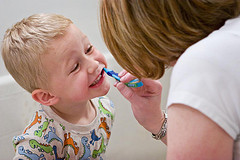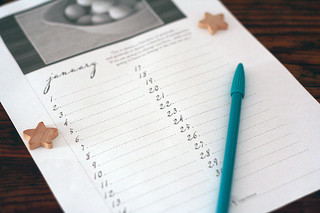8 Ways to Keep Your Mouth Healthy
A Plea for Flossing From Our Dental Hygienists
Have you heard the recent news that flossing might not be necessary?
Morning Breath Explained
Helpful Tips for Tooth Care in the New Year
 If you’re like the majority of us at the beginning of the New Year you make resolutions concerning your physical health such as stopping smoking, beginning an exercise program and eating healthier. But what about your dental health? Experts say it only takes 21 days to form a habit so if you begin taking better care of your teeth today, by the end of the month these important tips will already be a part of your daily routine.
If you’re like the majority of us at the beginning of the New Year you make resolutions concerning your physical health such as stopping smoking, beginning an exercise program and eating healthier. But what about your dental health? Experts say it only takes 21 days to form a habit so if you begin taking better care of your teeth today, by the end of the month these important tips will already be a part of your daily routine.
- Begin flossing once a day. There aren’t any hard and fast rules concerning the best time of the day to floss; just make sure you allot enough time to do the job properly.
- Limit sweets and starches. This might already be part of your losing weight resolution but did you know foods which contain large amounts of either or both can cause a greater build-up of plaque? If allowed to remain on and around the teeth, plaque causes gum irritation which can eventually lead to gum disease and possibly even tooth loss.
- Eat more fruits and vegetables. Fruits like apples and watermelon have higher water content which helps to wash away the natural sugars before they can turn into plaque. Plus the roughness of a carrot stick, apple slice or broccoli floret acts as a natural toothbrush, gently scrubbing away that nasty plaque causing bacteria.
- Remember the importance of both protein and calcium to help strengthen tooth enamel. Replace those sweet donuts and greasy chips with nuts. Add more lean protein such as skinless chicken, baked instead of fried. Substitute whole milk with the low or non-fat variety.
- Start the year out right by picking up the phone and scheduling your bi-yearly dental appointments. It is so important to see your dentist on a regular basis to keep any minor problems from turning into something major.
For the best in Crestwood dental care for your entire family please contact the caring staff at Ellis Dental today.
Photo Credit
How a Parent’s Dental Health can Affect Their Children
 Growing up you probably heard your parents say, “Do as I say, not as I do” and swore when you had kids you would never repeat that same sentence. Now as you drink sugary sodas, eat chewy sticky candy and keep putting off that long neglected dental appointment, you hear those same words coming out of your mouth. As a parent it is important to teach your child good oral health beginning at an early age. But as we all know, children learn through example. If they don’t see you taking care of your teeth along with getting regular dental exams, chances are pretty good they won’t understand just how important good dental health really is.
Studies have shown definite correlation between the frequency of tooth brushing in a parent and the same degree of frequency of tooth brushing in their children. Research has also determined both oral hygiene skills and a parent’s attitude toward oral hygiene play a major role in a child accepting brushing and flossing as part of their daily routine.
Growing up you probably heard your parents say, “Do as I say, not as I do” and swore when you had kids you would never repeat that same sentence. Now as you drink sugary sodas, eat chewy sticky candy and keep putting off that long neglected dental appointment, you hear those same words coming out of your mouth. As a parent it is important to teach your child good oral health beginning at an early age. But as we all know, children learn through example. If they don’t see you taking care of your teeth along with getting regular dental exams, chances are pretty good they won’t understand just how important good dental health really is.
Studies have shown definite correlation between the frequency of tooth brushing in a parent and the same degree of frequency of tooth brushing in their children. Research has also determined both oral hygiene skills and a parent’s attitude toward oral hygiene play a major role in a child accepting brushing and flossing as part of their daily routine.
Often because of wide array of socioeconomic reasons, including not being taught proper dental care when they themselves were children, cost of dental procedures, lack of dental insurance and not understanding the importance of primary teeth, new parents have to be educated on how to care for their child’s teeth. Today, many pediatricians have begun teaching parents on how tooth decay can affect their child’s overall general health. They also are strongly suggesting a child have their first dental appointment between the ages of 12 to 18 months.
Ellis Dental accepts new patients of all ages and would be proud to be your child’s oral health care provider, they even offer well baby exams at no charge for all children under the age of 2. With two small children of her own, Dr. Ellis understands completely the challenges parents can face when it comes to teaching their children proper dental care. Please call us today at 314.965.1334 for more information or to schedule an appointment.
Photo Credit
Five Ways to Protect Your Child’s Teeth
 Preventive dental care for your child is vitality important and neglecting their oral hygiene can have long-term damaging effects.
Preventive dental care for your child is vitality important and neglecting their oral hygiene can have long-term damaging effects.
- Even before that first tooth erupts it’s important to clean your child’s gums on a daily basis by using a soft cloth or a piece of gauze dipped in warm water and gently rubbing.
- Start brushing as soon as one tooth appears and begin to floss when your child has two teeth that touch each other. Brushing should be done twice a day but if that isn’t possible make sure your child always brushes before going to bed.
- Don’t put your child to bed with a bottle and once off the bottle, limit how frequently they use a sippy cup. Anything other than water can cause bacteria to grow which in turn causes the acid that creates tooth decay. Plus the constant pressure of a nipple or hard plastic spout can affect the “bite” or shape of the mouth.
- Introducing your child at a very early age to good nutrition will help with good dental health. Limit juice to mealtime or as a special treat and don’t just assume because a snack is suppose to be “healthy” that it isn’t damaging to your child’s teeth. Things like granola bars and dried fruit are sticky and can leave residue on the teeth.
- Pay attention to the medications your child is prescribed. Many have a sweet sugary base that lingers on teeth after the medication is taken. Make sure to have your child rinse their mouth or brush their teeth after dosing.
For more helpful tips on how to care for your child’s teeth or to schedule their first dental appointment, please contact Ellis Dental today.
Dental Health Resolutions for the New Year
 At the beginning of each New Year if you’re like the majority of us you have a list of resolutions you’re determined to keep; and they probably revolve around losing weight, going to the gym and getting out of debt. But I bet nowhere on the list do you resolve to improve your dental care. Make this year different by adding some of these dental health resolutions to your list.
At the beginning of each New Year if you’re like the majority of us you have a list of resolutions you’re determined to keep; and they probably revolve around losing weight, going to the gym and getting out of debt. But I bet nowhere on the list do you resolve to improve your dental care. Make this year different by adding some of these dental health resolutions to your list.
- Resolve to floss every day. While everyone knows the importance of flossing, statistics show that only 50 percent of people surveyed do it on a daily basis. Flossing removes the harmful bacteria and plaque from between teeth and below the gum line which can lead to gingivitis and gum disease.
- If you smoke: STOP! Smoking or using smokeless tobacco increases your risk for recessed gums, oral cancer, tooth discoloration and even tooth loss.
- Increasing fruits and vegetables is also important for your overall dental health. Eating nothing by junk and processed foods can affect your immune system and increase the risk for many common oral problems including periodontal disease. The antioxidants in fruits, vegetables, nuts and beans help fight harmful bacteria and work to build up your overall immune system.
- If you drink alcohol, don’t overdo it. Studies have shown overindulging can cause gum recession. Plus, people who abuse alcohol often have poor eating habits, are heavy smokers, don’t brush and floss on a regular basis and generally neglect their overall health.
- Make sure to visit your dentist on a regular basis. Most dental insurance plans include twice yearly cleanings and check-ups where many concerns can be addressed before they become major problems.
We here at Ellis Dental want to wish everyone a very Happy New Year! To schedule your first appointment of 2014, please call our office at 314.965.1334 or use our convenient on-line scheduler.
Photo Credit
Correct Flossing Methods
Many people don’t floss because they simply aren’t sure how to do it correctly. We here at Ellis Dental understand and want to help. Begin following these easy and simple steps and soon you’ll be flossing like a pro. And then you won’t have to evade that routine question we always ask at your bi-yearly appointment, “Are you flossing every day?”
- Start by purchasing the correct type of floss. If your teeth are close together and the floss snags or breaks when being used, select waxed floss or one that is specifically marketed for this problem.
- The American Dental Association has taken the stance it doesn’t matter if you floss before or after you brush, just as long as you do it once a day using the correct flossing method.
- Using 18 inches of floss, wrap the strand around both middle fingers and then grasp between 1 to 2 inches of the floss between your index finger and thumb.
- Gently maneuver the floss between two teeth in a see-saw motion. It doesn’t matter where you start, just as long as you give equal attention to all of them.
- It is very important to angle the floss correctly to ensure you are getting it slightly below the gum line. Form the shape of a “C” to properly hug the tooth.
- As you continue to floss slowly unwind the clean floss from one side of your finger and wind the used section onto the other finger.
Need some assistance to ensure you are flossing correctly? Please don’t hesitate to ask Lore or Denise for hands on instructions along with helpful tips next time you are in for your regular cleaning
Photo: Google





